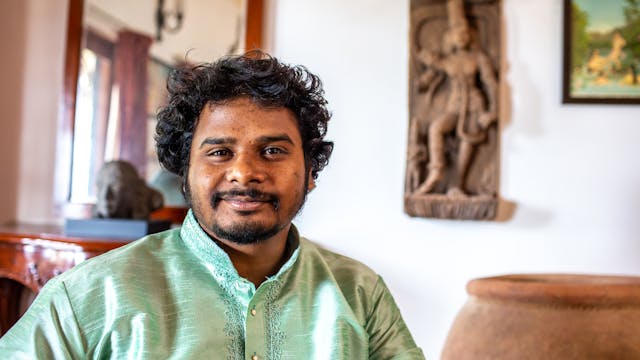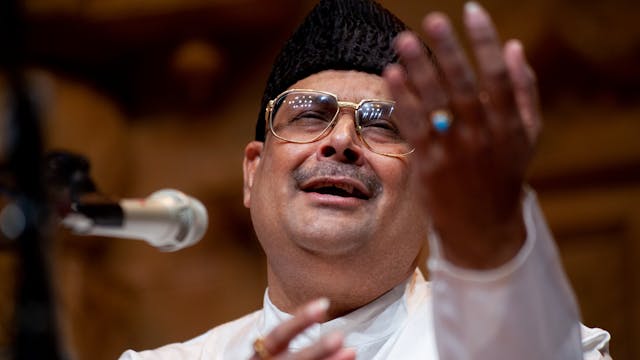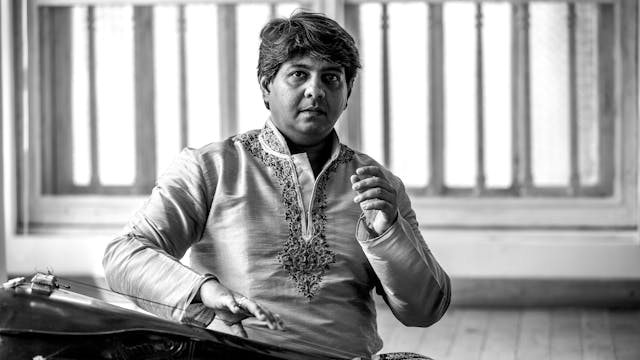Pandit Ajoy Chakraborty | Dadra in Mishra Sindhu Bhairavi
Hindustani Vocal
•
23m
Recorded at Darbar Festival 2006, on 5th March, at the Peepul Centre, Leicester.
Musicians:
- Pandit Ajoy Chakraborty (khayal)
- Chiranjib Chakraborty (harmonium)
- Subhankar Banerjee (tabla)
- Kaviraj Singh (tanpura)
Raag Sindhu Bhairavi, Thaat: Asavari, Samay: Early Morning
In 2006, Darbar presented Pandit Ajoy Chakraborty in an exclusive evening in his semi-classical avatar. The semi-classical or lighter segment is a by-product of folk music and an off-shoot of pure classical music that consists of a deluge of forms in which Pandit Chakraborty holds a position of respect and reverence for his deep knowledge, experience and authority on the subject.
In this video, he performs the much-anticipated ‘Kya Karoon Sajni Aye Na Balam’ - a dadra that he counts as the turning point in north Indian semi-classical music spurred by Ustad Bade Ghulam Ali Khan (1923-1967), the father of the Patiala gharana and his younger son, Ustad Munawar Ali Khan (1930-1989). Before he embarks on this rendition, he acknowledges the contribution of Ustad Bade Ghulam Ali Khan in giving the thumri of Benares (Varanasi) a new form by entwining it with the flashy and vivacious vocalisations of the Patiala gharana.
Thumris and dadras are a semi-classical form that took birth in the spiritual city of Varanasi and their style of rendition came to be known as ‘purab-ang gayaki’ which means ‘style of the north’. This style roots in patient and delicate handling of its elaborations as opposed to the perky, boisterous and more complex layering of the Patiala gharana. Naturally, with Ustad Khan’s additions, the character of thumris and dadras assumed a livelier and more colourful format that expanded its appeal and extended its reach beyond the niche audience.
Pandit Chakraborty also conveys his respects to one of his gurus, Pandit Gnan Prakash Ghosh, who, he informs, was a close musical associate and colleague of the great Ustad Bade Ghulam Ali Khan.
Pandit Subhankar Banerjee plods with Pandit Chakraborty’s languid pace, his tabla accompaniment showing no trace of showmanship but a keenness to compliment the vocalist’s musical design. He fills
up the lagghi with crisp and rapturous spates of micro-beats rolled within the spacious downbeats of the rhythmic cycle, enriching the rendition manifold.
Chiranjib Chakraborty on the harmonium is a revelation, especially in this piece where the melodic explorations of Pandit Chakraborty lurk unpredictably throughout the rendition. His replications are confident, well-anticipated and sincere to say the least. He also manages a few fillers, proving his ability to add his own to the overall scheme.
Up Next in Hindustani Vocal
-
Ramakant Gaikwad | Marwa
Filmed and recorded live at Mulshi, Maharashtra
Musicians:
- Ramakant Gaikwad (khayal)
- Ramkrishna Karambelkar (tabla)
- Abhinay Laxmikant Ravonde (harmonium)
- Gayatri Gaikwad & Dr. Aparna Shenoy (tanpuras)Raag Marwa, Thaat: Marwa, Samay: sunset
Recorded live against the stunning, rugg...
-
Pandit Ajoy Chakraborty | Banke Bihar...
Recorded at Darbar Festival 2006 on 4th April at the Phoenix Theatre, Leicester.
Musicians:
- Pandit Ajoy Chakraborty (khayal)
- Chiranjib Chakraborty (harmonium)
- Subhankar Banerjee (tabla)
- Kaviraj Singh (tanpura)Krishna Bhajan
In 2006, Darbar presented Pandit Ajoy Chakraborty in an exclu...
-
Omkar Dadarkar | Ramkali
Filmed and recorded live at the Bawali Rajbari, Kolkata, India in 2017.
Musician:
- Omkar Dadarkar (khayal)Raag Ramkali; Thaat: Bhairav; Samay: Morning
Ramkali is an early morning raga, often associated with Sikh devotional cultures. Many Sikh saints have set 'shabads' (spiritual verses) to t...



